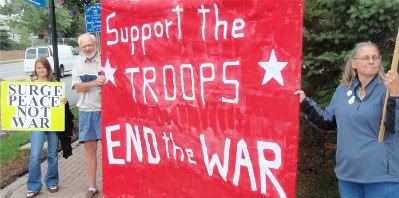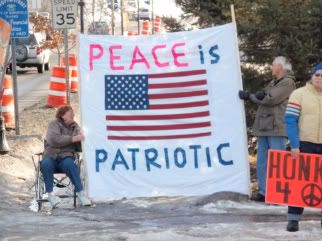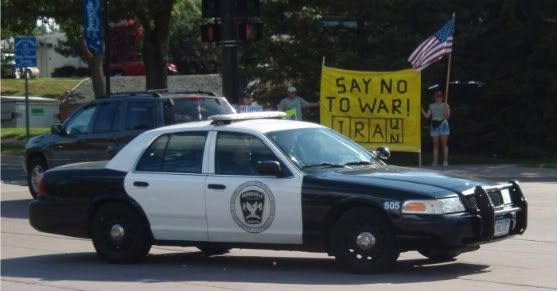Anthony Shadid at the Washington Post has a recent article about the pervasive influence of the American occupation on Iraqi culture (copied below). According to Shadid, some (mostly younger) Iraqis have embraced elements of American culture like rap, heavy metal and tattoos, while other Iraqis reject the changes. Great article, makes me wonder: how many Americans could name one famous Iraqi singer, or one Iraqi TV show, or one Iraqi Arabic word, or other marker of Iraqi pop culture?
A Quiet but Undeniable Cultural LegacyU.S. Occupation of Iraq Will End, but a Host of American Influences May Linger
By Anthony Shadid
Washington Post Foreign Service
Sunday, May 31, 2009
http://www.washingtonpost.com/wp-dyn/content/article/2009/05/30/AR2009053002145.html
BAGHDAD
Across the street from the tidy rows of tombstones in the British cemetery, mute testimony to the soldiers of an earlier occupation, Mustafa Muwaffaq bears witness to the quieter side of the United States' six-year-old presence in Iraq.
In wraparound sunglasses, shorts and shoes without socks, the burly 20-year-old student waxes eloquent about his love for heavy metal of all kinds: death, thrash, black. But none of it compares, he says, to the honky-tonk of Alan Jackson, whose tunes he strums on his acoustic guitar at night, pining for a life as far away as a passport will take him.
"You know, I wanna go to Texas and be a country boy," he said, as he stood in the sweltering shade of Baghdad's Academy of Fine Arts. "I wanna be a cowboy, and I wanna sing like one."
All occupations eventually end. When this one does, history's narratives will be shaped by the cacophony it wrought -- the carnage unleashed by the U.S.-led invasion that threatened Iraq's notion of itself as a country and that will haunt generations to come.
But the whispers may linger just as long -- the far quieter way in which two cultures that often found it difficult to share the same space intersected to reshape Iraq's language, culture and sensibility. From tattoos of Metallica to bellybutton piercings, from posters for a rap concert in Baghdad to stories parents tell their naughty children in Fallujah of the Americans coming to get them, the occupation has already left its mark.
There is the bellicose language of the checkpoint: "Go" and "Stop" (often rendered as "stob" in a language with no "p"), along with a string of American expletives that Iraqi children imitate with zeal. In parks along the Tigris River, they play "tafteesh," Arabic for inspection. Iraqi troops, sometimes indistinguishable from their U.S. counterparts, don the sunglasses considered effeminate in the time of Saddam Hussein.
Some Iraqi youths even dip Skoal tobacco.
"It's inevitable that they're going to leave a trace on us after they depart," said Yahya Hussein, a soccer coach, former player and denizen of Baghdad's Karrada neighborhood.
'These Are the Times'
Hussein left Kawkab al-Sharq cafe -- named for a legendary Egyptian singer of another era -- where waiters ferried tea, Nescafe and a water pipe known as a nergilla, a word taken from Persian. His family's history in Karrada stretches back 11 generations, and as he strolled along the neighborhood's main thoroughfare, he spoke with the authority of experience.
"All this," he said, pointing at a kiosk, "came after the occupation."
Rickety stands along the street overflowed with goods. Toy guns emblazoned with the moniker "Super Police" sat next to imitation handcuffs and walkie-talkies. A doll dressed in fatigues, with dog tags around its neck, carried an M-16 rifle, familiar to Iraqis as a weapon of the U.S. military. With a squeeze of the doll's hand, Freddie Mercury belted out Queen's "We Will Rock You" to a street speaking Arabic.
"These are the times," Hussein said.
Bootleg copies of "Star Trek," "Valkyrie" and "Marley & Me" were on sale, along with CDs by Eminem, 50 Cent and Massari. On a wall was an ad for a concert by Rap Boys, billed as the "first and biggest rap party in Baghdad."
Youths asked a barber across the street for the latest haircut, which they call "spiky"; one barber insisted that the name came from a soldier's nickname for his military dog. The soldier's version of a crew cut is called "Yankee" (or, sometimes, "bankee").
Businesses hawked camouflage-patterned men's underwear. "Harley," a kind of biker boot, went for $125. "Texas," the cowboy version, cost $100.
For each item, Hussein had a simple phrase: "after the suqut," the fall of Saddam Hussein.
The Long Perspective
Iraq remains a proud country, its people bridling at what they see as the condescension inherent in the United States' modern-day equivalent of a civilizing mission. History, thousands of years of it, forms the refrain of any conversation: Mesopotamia gave birth to civilization, and at its medieval zenith, as Europe slumbered, Baghdad was a city of racetracks, law schools, museums, libraries, hospitals, zoos and insane asylums.
The country's past shamed its present, and in the wake of Hussein's fall in 2003, many Iraqis, however suspicious, were willing to give the Americans the benefit of the doubt. Now, many blame them for everything from sectarian strife to Baghdad's disrepair. The only kind of American most Iraqis have met is a young, gun-toting soldier, and a look of scornful incomprehension often greets a question about the Americans' cultural legacy.
"What are they leaving behind?" asked Mohammed Chayan, a 45-year-old painter sitting with friends at the Madarat Cafe and Gallery, near a wall of concrete barriers.
"There's never really been interaction with society," he said. "When they came to visit, it wasn't artists who showed up. It was soldiers coming down from their tanks."
"They were isolated," admitted Mohammed Rasim Kasim, a filmmaker and photographer. "But," he added, "I have to disagree with my colleague."
Kasim, a bearish, cheerful man, said that before 2003 he had traveled only to neighboring Jordan. Since then, he has visited the United States, Turkey, Syria, Lebanon, Germany and Austria. And an image lingers from his travels: recognizing a car in Berlin as a U.S. military vehicle not because it was part of an armored convoy snarling traffic for a mile behind it, as in Iraq, but because he spotted the tiny inscription on its license plate: "U.S. Army."
"It was written so small," he said, still amazed at how inconspicuous it was.
"I'm not defending their presence, but that's not all it was. We have to be honest," Kasim told his friend. "We paid a very high price, but it was the price of freedom."
Chayan shook his head.
"We haven't seen a bright side," he said. "Well, there's no bright side to colonization, we can say that. But the Americans could have left something positive behind. What makes me sad, wherever I go, whenever I go, I just see remains of destruction."
A friend of Chayan's stopped by briefly. "Peace be upon you," he said. The two men traded words of endearment in a staccato burst of familiar Arabic: "My heart," "My dear," "My soul." Then Chayan bade him goodbye: "With peace." His friend's response was distinctly Iraqi, a word borrowed decades ago from English and now used as a greeting, as a farewell, as thanks or as welcome.
"Hello, hello," he said.
The British Interlude
The British entered Baghdad in 1917 to end Ottoman rule, with the same pledge the Americans would make. "Our armies do not come into your cities and lands as conquerors or enemies, but as liberators," proclaimed Maj. Gen. Sir Stanley Maude. Like the Americans, the British faced a revolt, in 1920, led by a segment of the population that had grown frustrated and resentful at the heavy-handedness of a foreign army.
British rule lasted until 1932, and its waning influence ended with the fall of the Hashemite monarchy in 1958. By then, it had left an indelible mark on Iraq's culture and society. Everything from post offices and nightclubs to the railway stations and double-decker red buses that ran in the capital until the last days of Hussein's rule bore a British stamp. So did the military, the judiciary, the health system and the ministries.
Even today, English instructors in Iraqi universities favor a British accent.
"The British created the system. We inherited it from them," said Adnan Pachachi, an 85-year-old lawmaker and former diplomat who entered Iraq's foreign service in the last years of the monarchy. "Of course, Iraqis then added to it."
Words borrowed from the British still litter Iraqi Arabic, albeit with a local inflection: glass, bottle, bicycle, rail, battery, ice cream, counter, blanket, jerrycan, gear, dashboard (dishbool), table (tabla) and lousy (malyous). "Wrongside" means to drive the wrong way down a one-way street. Some argue that the word for tea glass, istikaan, comes from the phrase "ice tea can." (Others insist the word is derived from Persian.)
And, of course, "hello."
American Dreams
Abu Naji was the nickname Iraqis gave their British occupiers. There remains no equivalent for the Americans, but a slew of words describe those who imitate them. The older term for someone becoming more American than Americans was mitamrik, or Americanized. More conservative types here call such people khanazeer or quruud, "pigs" or "monkeys." One student at the Academy of Fine Arts coined another name.
"Am-raqis," she said.
The students agreed there has been an infitah, or opening -- the word many use for the plethora of influences that followed the occupation, imported through the Internet and satellite television, each banned to varying degrees under Hussein. But many of them echoed the question heard at the Madarat Gallery: What has freedom brought?
"You can say what you want to say, and you don't care what anyone else thinks," said Raed Ibrahim, a 23-year-old painter at the academy. "That's my freedom. Anyone can grasp it."
Shahid Shaker, a 21-year-old sculptor, looked at the ground, then spoke up. "Don't exaggerate," she told him softly. "Yes, the occupation brought freedom. But it destroyed culture, too. We're being educated in a culture of violence."
"Sometimes," she added, "there is too much freedom."
Imported pornography is sold openly in Baghdad's Bab al-Sharji market. Popping pills is something of a fad. On campus, dating has grown more permissive. The reality TV show "American Idol," broadcast by a Saudi-owned satellite channel, has its fans. Citing songs by 50 Cent and Metallica conveys a certain hipness. So do tattoos; Shaker says 40 percent of students have one, a remarkable figure given that they were once a mark of prison time.
"I'm going to get one as soon as I get the money," Ibrahim volunteered.
'Havee Matel Mark'
Mark Apram, the most popular tattoo artist in Baghdad, charges $50 for his work. Twenty-nine and married, he sometimes works from his cramped apartment, where a wall bears the words "Havee Matel Mark" over his painting of a red-eyed devil with pitchfork. ("Did I spell it right?" he asked.)
The room is a potpourri of American influences: a picture of an FHM model laminated on his coffee table; a stuffed Taz, the Tasmanian devil from Looney Tunes; an Incredible Hulk action figure. His shirt, embossed with images of Tupac Shakur and Snoop Dogg, reads, "The Hood, the Bad and The Guilty."
"Anything American, I love it," he said. "It's what makes me happy."
Apram estimates that he has done a million tattoos since the Americans invaded, inspired by the Internet and by designs he saw on soldiers' arms when they rolled up their sleeves. "Maybe even more," he responded to a look of disbelief.
He is an advertisement for his own work. His left arm bears the images of a scorpion, the sun, the Virgin Mary and the name of an old girlfriend, Rana. (His pregnant wife has begged him to remove that one.) Being right-handed, he has left his right arm bare. On his right leg are tattooed a dragon and the letter E, for Eminem.
Butterflies and flowers are most popular with girls, he said. Men prefer skulls, a barbed-wire-like design, Metallica and the names of daughters, wives and girlfriends. Some ask for a dragon. A teenage boy wanted a Harley-Davidson motorcycle.
The Internet has been influential, he said, as have satellite TV channels. But as he sees it, his success is a legacy of the presence of tens of thousands of American troops in his country.
"They're the origin of all of it," he said. "They're teaching us how to act."
A Military Lexicon
The military aesthetic may prove to be this occupation's most lasting cultural artifact. If the British can claim credit for an array of industrial words used by Iraqis, including "radiator" and "machine," the Americans are responsible for a military lexicon that is still evolving.
"Hummer" has entered Iraqi dialect as the word for the armored jeeps known as Humvees, as has the Arabic-inflected plural, Hummer-at. "Buffalo" is the word for MRAPs, the hulking Mine Resistant Ambush Protected vehicles. "Chocolate, mister!" or "Soccer ball, mister, soccer ball!" children shout to troops in Sadr City, a Baghdad slum of soggy trash and stagnant pools of sewage.
Badg-at has become Iraqi Arabic for identity cards. Other words and phrases have been picked up from soldiers at checkpoints or conducting house raids or foot patrols: "Relax," "Please," "Sorry," "No problem," "Oh, my God," "Give me five." Almost any youth can hurl a string of American expletives whose Arabic equivalent would earn them a slap across the face.
The war has inspired new Arabic words, as well. Hawasim, the name Hussein bestowed on his last battle in 2003, has come to mean booty looted in its aftermath. Arabic rendered literally from English at checkpoints -- "Prepared to capture criminals" or "Prepared to help" -- reads like the Arabic subtitles of an American movie.
As in the Palestinian territories, where security forces sometimes copy the style of their Israeli occupiers, Iraqi soldiers are now sometimes indistinguishable from their American counterparts, resembling a scaled-down version of a football player.
There is the desert camouflage, along with sunglasses and, occasionally, gloves. The black leather boots of the Hussein era have given way to a khaki suede variety. Holsters have gone from the hip to the thigh. The soldiers are equipped with kneepads, though they usually droop down to their ankles. No one was seen with a flak jacket before the invasion. Nor did anyone roll up their sleeves or tuck their pants into their boots.
Even the posture is American: rifle carried high, finger on the trigger.
And a fist thrust forth has come to mean stop.
"They look like peacocks," declared Abu Ali Rubai, a 60-year-old uniform vendor. "They wear this and that," he said, pointing at a holster nicknamed Rambo, combat boots called Swat, and plastic handcuffs. "They're like a child playing with toys."
He ruffled through bags filled with the gold-colored insignia of the old army's medical corps, tanks, special forces and artillery. He pointed out the colors of the berets that no one buys anymore -- blue for air force, beige for infantry and red for military police. Then he grabbed fistfuls of new badges, most of them in English and Arabic. There was Special Forces, with its skull and crossed arrows (sometimes written as Special Farces). "Iraq Army" was printed in English. So was SWAT. One badge read, "Ministry of Interiors."
Rubai cast a longing eye at his favorite uniform, worn by Abdel-Karim Qassem, the officer who overthrew the monarchy in 1958, in a portrait that hangs behind his desk. It was a woolen, British-style uniform with a hat known as the sidara, or faisaliyya. Four blue versions of the hat still hung from nails in the wall, gathering dust.
"The old ones were more distinguished," Rubai said. Then he recited a stanza by Maaruf al-Rusafi, a nationalist poet who died in 1945.
The English are not our saviors,
Even if they have made pledges to us in writing.
When has a strong man had pity for the weak?
How does a master make a pledge to his sheep?
We are but prisoners in their hands
And by the pledges they have written that shackle us.
By God, even if we were monkeys,
Monkeys would not accept being our kin.








 Imam Zaid Shakir is amongst the most respected and influential Islamic scholars in the West. As an American Muslim who came of age during the civil rights struggles, he has brought both sensitivity about race and poverty issues and scholarly discipline to his faith-based work. His article in the current Tikkun, "Obsessed with Defamation and Slander," rebuts the charges of "Islamofascism" made by the widely disseminated "Obsession" DVD and in much commentary about Islam as a whole.
Imam Zaid Shakir is amongst the most respected and influential Islamic scholars in the West. As an American Muslim who came of age during the civil rights struggles, he has brought both sensitivity about race and poverty issues and scholarly discipline to his faith-based work. His article in the current Tikkun, "Obsessed with Defamation and Slander," rebuts the charges of "Islamofascism" made by the widely disseminated "Obsession" DVD and in much commentary about Islam as a whole.



















